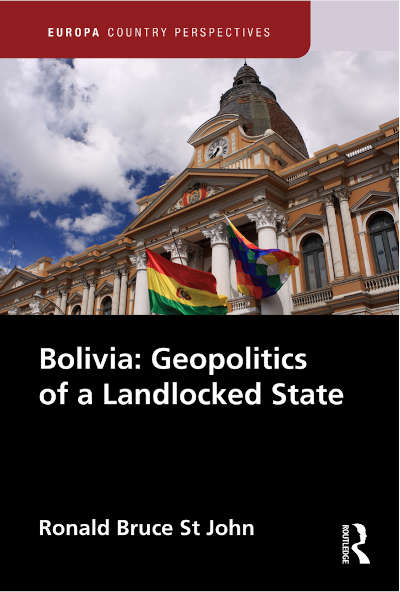In the picture
Book cover of Ronald Bruce St John's book 'Bolivia: Geopolitics of a Landlocked State' (New York: Routledge, 2021) 264 pages.
Throughout history, several authors and naval strategists have pointed out the importance of the sea for the development of a country. Around the 5th and 6th century B.C., Themistocles already distinguished the importance of the sea by warning that "he who dominates the sea, dominates everything". Later, authors such as Walter Raleigh, in the 16th century, continued with this thought: "He who rules the sea, rules the trade; he who rules the trade, rules the world". Not surprisingly in the 20th century, John F. Kennedy also attributed great importance to it: "Control of the sea means security. Control of the sea can mean peace." However, what about the 44 recognized landlocked countries? Perhaps even more interestingly, what about 32 underdeveloped landlocked countries? How badly are they affected by their lack of sea? Can they even prosper? Questions such as these were the ones Ronald Bruce St John asked himself when he wrote the book 'Bolivia: Geopolitics of a Landlocked State', where he recounts the history of Bolivia, a landlocked state, and how this historical fact continues to have repercussions more than a century later.
Bolivia definitively lost its access to the ocean in 1904, when it officially recognized its defeat by Chile in the War of the Pacific (1879-1884). Clearly this event impacted the country's geography; however, it can sometimes be easy to overlook how it also impacted and continues to impact Bolivian politics and Economics . Throughout the book, the author explores how the lack of access to the sea poses various problems for government and business, and consequently for Bolivia's development .
Bolivia is a clear example of the challenges presented by the lack of access to its own ports in underdeveloped countries. But although this problem is common to these nations, Bolivia differs from the rest in the solution it proposes: to insist time and again on wanting to recover a sovereign outlet to the sea. The approach is shared by the majority of Bolivians, who not only see this access to the Pacific as the only way to national prosperity, but still consider it possible even after 100 years and against what was signed at the time. This optimistic mentality inspires Bolivians at all times and explains much of their actions abroad, with petitions and appeals presented at all times before regional and international organizations.
To understand this 'fixation' we must go back two centuries, to the time of the emancipation of the American republics. When Bolivia became independent in 1825, it gained the Atacama coastline. It was an isolated desert coastal region, with no major ports or important trade routes; in fact, in the colonial era, the Bolivian interior did not use these beaches. However, the dispute over the exploitation of guano and saltpeter, which eventually developed into concessions granted to Chilean companies, eventually led to war. Chile declared war on Bolivia, which was assisted by Peru. With its victory, Chile took over the entire coast, as well as the coastline to the north, already in Peru. The result of the war was recognized by Bolivia, which on October 20, 1904 formalized the loss of its outlet to the sea by signing the Treaty of Peace and Friendship with Chile (this delimitation being consolidated in international law, a modification is very difficult without Chilean consent). In exchange, it obtained from Chile the right to trade from several Chilean ports, with toll-free transit to or from La Paz, by means of a railroad that the winning country undertook to finance. It was only one of the territorial losses of Bolivia, whose extension today is half of the territory it possessed when it became independent, but certainly the most painful: its wound has not healed.
With the loss of its coastline, Bolivia lost its ability to independently control its maritime trade routes, depending on other countries to enter the international market. This was a major setback, creating a dependence on neighboring countries, mainly Chile. This has made it more vulnerable to unforeseen economic cycles. At the same time, it has conditioned relations with other countries. Bolivia keeps the maritime issue very present in its international positions, appealing even to the International Court of Justice in The Hague (the last time, unsuccessfully, was in 2013-2018). These are not only actions of the Government, but its demands are supported by the street. The War of the Pacific marked the collective report of Bolivians, boosting nationalist feelings of recovering the sea and increasing resentment towards Chile.
Despite the omnipresence of this issue in the country's public life, however, its weight in Bolivian society varies from period to period. As the book focuses on this issue, it is logical that it may seem that the only concern of Bolivians is this lost access to the sea, when the reality speaks of political struggles focused on very different issues, such as gas production, the protests of the coca growers' unions or the fights between the current president, Luis Arce, and his predecessor, Evo Morales. In any case, it can be said that St John correctly identifies Bolivian shortcomings: weak governance, limited state institutions and attention to the maritime issue, and how these have often combined to weaken an already weak state in critical situations.
All in all, St John's book is a comprehensive study of Bolivia's foreign policy and diplomatic efforts in search of its lost sea, analyzing the impact of its landlockedness on concrete issues in the country, such as Economics and politics, and how a historical fact can so profoundly alter the mentality of so many Bolivians, guided by hope, but also, in the end, by geopolitical imperatives.

